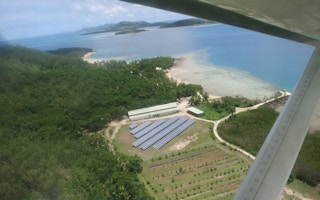The International Renewable Energy Agency (IRENA) has released a new report outlining a wide range of renewable energy solutions aimed at island tourism around the world.
The study, Renewable Energy Opportunities for Island Tourism, examines four renewable energy technologies — solar water heating, solar air conditioning, seawater air conditioning and solar PV systems.
“Analysis confirms that the use of these systems can boost the competitiveness of the island tourism sector significantly,” the organization says.
IRENA points out that while tourism is an important economic driver for island economies, energy supply, vital for the tourism industry, is still dominated by oil products, which increases islands’ vulnerability to the environmental impact of fossil-fuel use as well as to oil price volatility, which makes it difficult for the industry to remain competitive.
In addition to economic benefits derived from reduced energy costs, the IRENA report makes the case that a transition to renewable energy can reinforce sustainable tourism marketing strategies, which can in turn increase tourism and allow for higher room rates.
“
The cost of air conditioning and water heating from RETs is considerably lower than using electricity generated from diesel for the same service, while solar PV can generate electricity more cheaply than utility tariffs or self-generation from diesel in most islands
“Accelerated deployment of renewables also improves the well-being of island communities by reducing air and water pollution from fossil-fuel combustion and spillages, along with creating employment opportunities,” IRENA adds.
The Abu Dhabi-based organization says the report is aimed at policy makers, offering detailed information on the advantages of renewable energy targets, as well as at private sector investors and international financial institutions; renewable energy companies and power utilities; hotel chains and tourism operators.
By making use of renewable energy technologies, “the tourism sector can strengthen its sustainable development and marketing strategies, reduce its operating costs and lower its footprint through the reduced import of fossil fuels,” IRENA argues.
The report showcases four resorts and hotels that have benefitted dramatically by installing renewable energy systems:
- the Turtle Beach Resort in Barbados, which saved $1.5 million over a 16-year period after installing a solar water heating system
- the Turtle Island Resort in Fiji, which is saving $250,000 annually with its PV system
- the Intercontinental Bora Bora Resort & Thalassso Spa in French Polynesia, which boasts $720,000 in annual savings thanks to a seawater air conditioning system
- the Rethymno Village Hotel in Crete, which saves 70,000 kilowatt hours a year for cooling with its solar air conditioning system
“This report shows that renewable energy technologies (RETs) represent an economically attractive option for the island tourism sector,” the report concludes.
“The cost of air conditioning and water heating from RETs is considerably lower than using electricity generated from diesel for the same service, while solar PV can generate electricity more cheaply than utility tariffs or self-generation from diesel in most islands. Evidence from case studies and the analysis developed in this report show that a strong business case exists for hotels and tourism facilities in islands to invest in renewable energy.”










